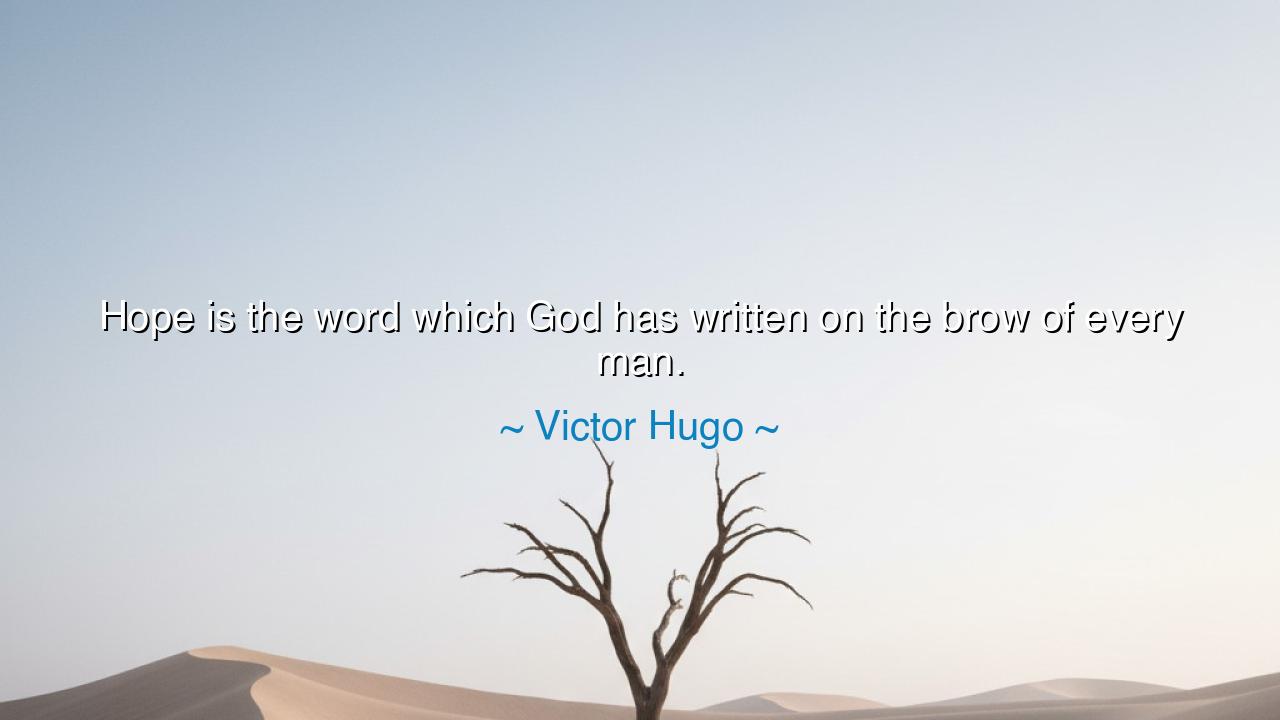
Hope is the word which God has written on the brow of every man.






“Hope is the word which God has written on the brow of every man.” — Victor Hugo
Thus spoke Victor Hugo, the prophet of compassion and the poet of the human soul. In this radiant declaration, he unveils one of the deepest truths ever uttered by mortal lips — that hope is not a gift reserved for the fortunate few, but a divine mark placed upon the very essence of humanity. It is the spark that glimmers in the eyes of the suffering, the strength that rises from the ashes of despair, the eternal whisper of God to His creation: “Endure, for there is meaning beyond the pain.” To live, says Hugo, is to be stamped by hope, to bear upon one’s brow the invisible signature of the divine will that calls us ever forward, even through the darkest night.
The origin of this thought flows from Hugo’s own life and the age he inhabited — a century of revolution, exile, and rebirth. The great author of Les Misérables and The Hunchback of Notre-Dame knew intimately the wounds of humanity. He saw the poor rise and fall, nations burn and rebuild, tyrants fall only for new ones to rise. And yet, amidst all this, he believed that within every person dwells an indestructible ember — hope, the holy defiance of despair. He saw it in the convict Jean Valjean, whose soul, once caged by sin and sorrow, breaks its chains through mercy and love. He saw it in the people of France, struggling through suffering toward liberty. Hugo’s words are thus both poetry and prophecy: Hope is not learned; it is born within us, placed there by the hand of God Himself.
To say that God has written hope “on the brow of every man” is to say that it is visible, if we only look closely. The brow — the face turned toward heaven, the countenance that bears joy and anguish alike — is the canvas of human destiny. Upon it, God has inscribed not resignation, but resilience. Even in tears, the light of hope can be seen shining faintly through, like dawn behind storm clouds. It is not erased by failure, nor aged by sorrow, nor buried by death; it lives, eternal and unyielding, in every human spirit that refuses to give up.
Consider the tale of Nelson Mandela, who endured twenty-seven years in a prison cell and emerged without bitterness. Though the walls around him were made of stone, the words of God upon his brow could not be confined. In his steadfastness, the world witnessed the truth of Hugo’s teaching — that hope is divine, and that no man, no chain, no darkness can strip it away. Mandela’s hope was not naive; it was forged in suffering, yet it burned all the brighter for it. When he walked free, he did not bring vengeance, but reconciliation, proving that hope, once nurtured, can transform not only the heart but the fate of nations.
Hugo’s message, however, is not only for heroes and saints, but for all who walk the earth. He reminds us that to lose hope is to deny our own nature, to smudge the divine inscription on our foreheads. Even the smallest act of endurance — a mother soothing her child in hunger, a laborer rising each morning to toil, a student dreaming beyond poverty — these are the daily miracles of hope in motion. Humanity survives not because it is strong, but because it believes. And belief, as Hugo saw, is simply another name for hope — the quiet trust that somewhere beyond the horizon lies the answer to our longing.
Yet hope, though written upon every brow, must be protected. For despair is ever near, whispering that life is meaningless, that goodness is lost, that tomorrow will never come. Against this voice, each soul must fight as a warrior of light. The armor is faith; the weapon is perseverance. To guard one’s hope is not weakness but courage — the greatest courage of all. For as long as we cling to hope, even by a single thread, we remain connected to the divine purpose that breathed life into us.
So, my children, take these words of Victor Hugo and inscribe them upon your hearts: Never erase the word that God has written upon you. When life is cruel, remember that the mark of hope still shines on your brow. When all seems lost, lift your face toward the heavens, for you bear the same sign that guided prophets, poets, and saints through the ages. Nurture your hope as a sacred flame — feed it with love, protect it with courage, and share its light with those whose own flames flicker low.
For in the end, hope is not a feeling but a divine commandment — a message from God to all humanity: “Live on. Believe still. The dawn is coming.” And as long as the word remains written upon the brow of man, no night, however long, can truly conquer the light.






AAdministratorAdministrator
Welcome, honored guests. Please leave a comment, we will respond soon